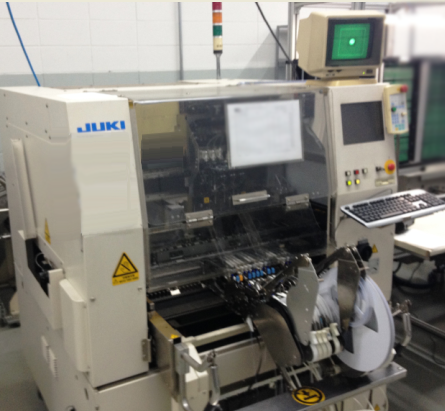Used ZEVATECH / JUKI KE 750L #9071801 for sale
URL successfully copied!
Tap to zoom


ID: 9071801
Pick and place machine
Power Requirements 208,220,240 VAC, single phase, 50/60 Hz, 3 KVA
Compressed Air Pressure: 5kgf/cm² (71 psi)
Flow: 150Nl/min (5.3 cfm)
Environmental Conditions: 10° to 35°C (50° to 95°F) operating. 50% (35°C) 90% (20°C) relative humidity, non-condensing
Noise: 80dB or less
System control:
Computer: Embedded 32 bit PC with 540 MB hard disk drive
3 1/2” Floppy Disc Drive
Color LCD Monitor, Keyboard with optional trackball.
Operating System: MS-Dos 6.20
Programming: Menu-guided entry of feeder data, placement data, production data, System test, auxiliary
operations through Graphical User Interface (GUI), on-line at the machine, Interactive Multi-Window System, Optional automatic program generation from CAD or Gerber Data
Programming Methods On-Line: Teach with placement head, teach camera.
Keyboard entry
Off-Line: Keyboard entry
Program Size:
Maximum 2,000 placements per circuit.
Maximum 100 non-matrix or 400 matrix circuits per PCB.
Data Entry Resolution: X/Y axis 0.004 (0.01mm), Theta axis (rotation): 0.05°
Up and Down Line connection: SMEMA Standard
Teach Camera
Accessories:
Auto tool changer: up to (18) vacuum nozzles
Placement:
Placement Heads: (3) high speed assembly heads
closed-loop twin AC servo motors and magnetic linear encoders
Component Centering: Non-Contact TouchLess Centering (TLC®) using LaserAlign™ Sensor.
Component Detection: Vacuum Sensor and Laser.
Placement Accuracy: LaserAlign™: +/- 0.003” (0.09mm) for QFP
+/- 0.0039” (0.1mm) for chips
Placement Angle: 360º in 0.05º increments
Placement Rate: 0.25 sec./component (throughput will depend on PCB size and component mix)
Component specifications:
Lead Pitch Minimum: 0.025” (0.65mm)
Component Packaging: Tape, Tray, and Stick (For bulk components contact factory for availability)
Number of Feeder: Inputs Up to (80) depending on Feeder Mix
Options:
Feeder float detector
Host line computer (HLC)
IC Collection belt
High-speed matrix tray changer
External programming unit (EPU)
Bad mark sensor
Feeder trolley
Component verification
Height measurement sensor
Tape cutter
Rear side monitor
Multi-tray holder
Area sensor
1998-1999 vintage.
ZEVATECH / JUKI KE 750L is a powerful and reliable pc board assembly and manufacturing equipment suitable for medium to high-volume electronic component placement applications. The system is designed for high-speed component placement from 0201 chips to BGA devices, along with the ability to handle leaded or lead-free soldering processes. The unit is built with a JUKI KE 760G high-performance placement head for maximum PCB productivity. It is equipped with a dual-head design and a deployable high-speed vision camera to tackle 0201 chip placement and higher accuracy requirements. The machine also features a high-speed component supply tool with a combination of tube feeders and tape feeders, providing efficient component handling and quicker part change-over. JUKI KE750L is also capable of performing multiple types of placement operations on a single board, from top mount placements, to SMD hot air soldering. The included 30 zone bottom pre-heating asset helps to ensure process quality by controlling substrate temperature for different components. The model includes a leaded soldering bath module for dip soldering of leaded components, providing a complete production solution. ZEVATECH KE-750L is easy to operate and maintain, with intuitive control settings, detailed diagnostics screens, and user-friendly communications protocols. The included touch screen graphical user interface helps operators of all levels to quickly learn and master the equipment functions. In addition, the system has a flexible vision unit featuring extended photometrics and expanded DoF settings to provide precise vision feedback loop control. In addition, numerous safety features help to ensure a safe working environment. The robust frame and construction supports up to 15kgs of PCB weight, ensuring a stable platform for components to be placed accurately and securely. A set of sensor arrays help provide an additional layer of safety, detecting foreign objects and anomalies to protect staff and machinery from damage.
There are no reviews yet